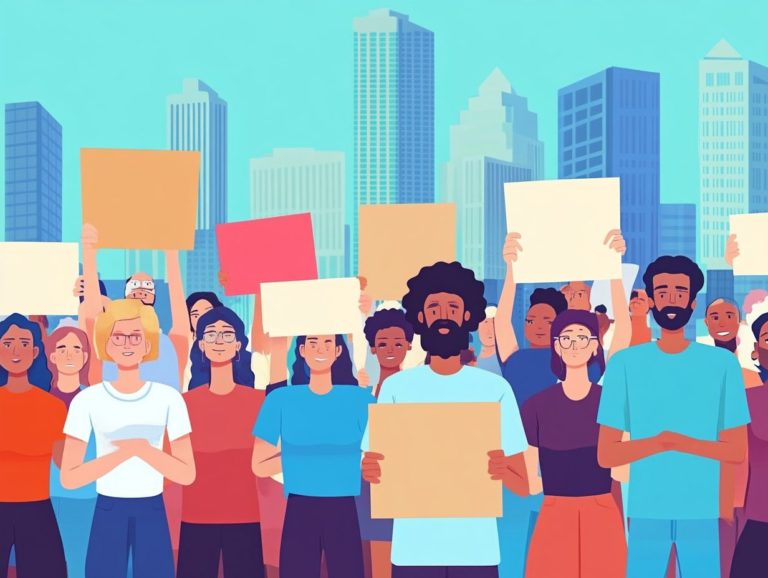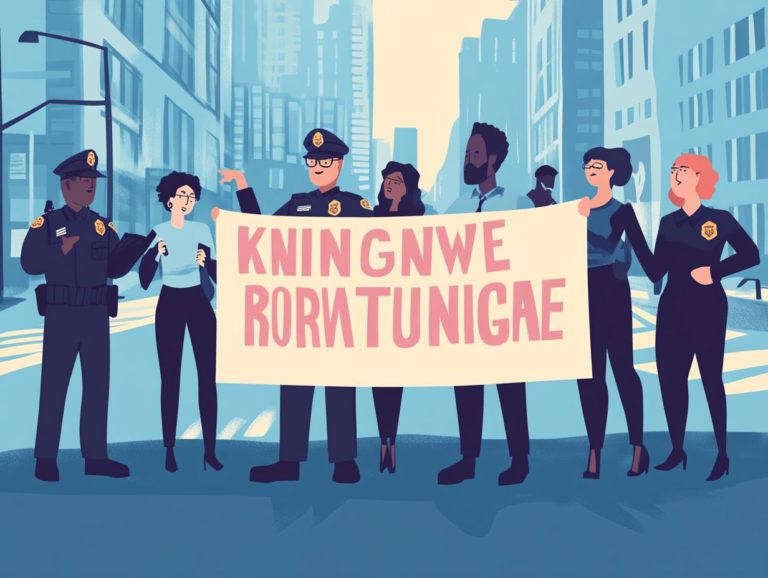How to Use Legal Aid to Know Your Rights
Navigating the legal system can feel like an intricate maze, especially when you’re unsure about your rights or how to access essential resources. Legal aid is a crucial lifeline for many, offering support to those who may struggle to afford legal representation.
This guide outlines the eligibility criteria, the various services available, and the application process. By familiarizing yourself with your rights and available resources, you can empower yourself to pursue the justice you deserve.
Contents
Key Takeaways:
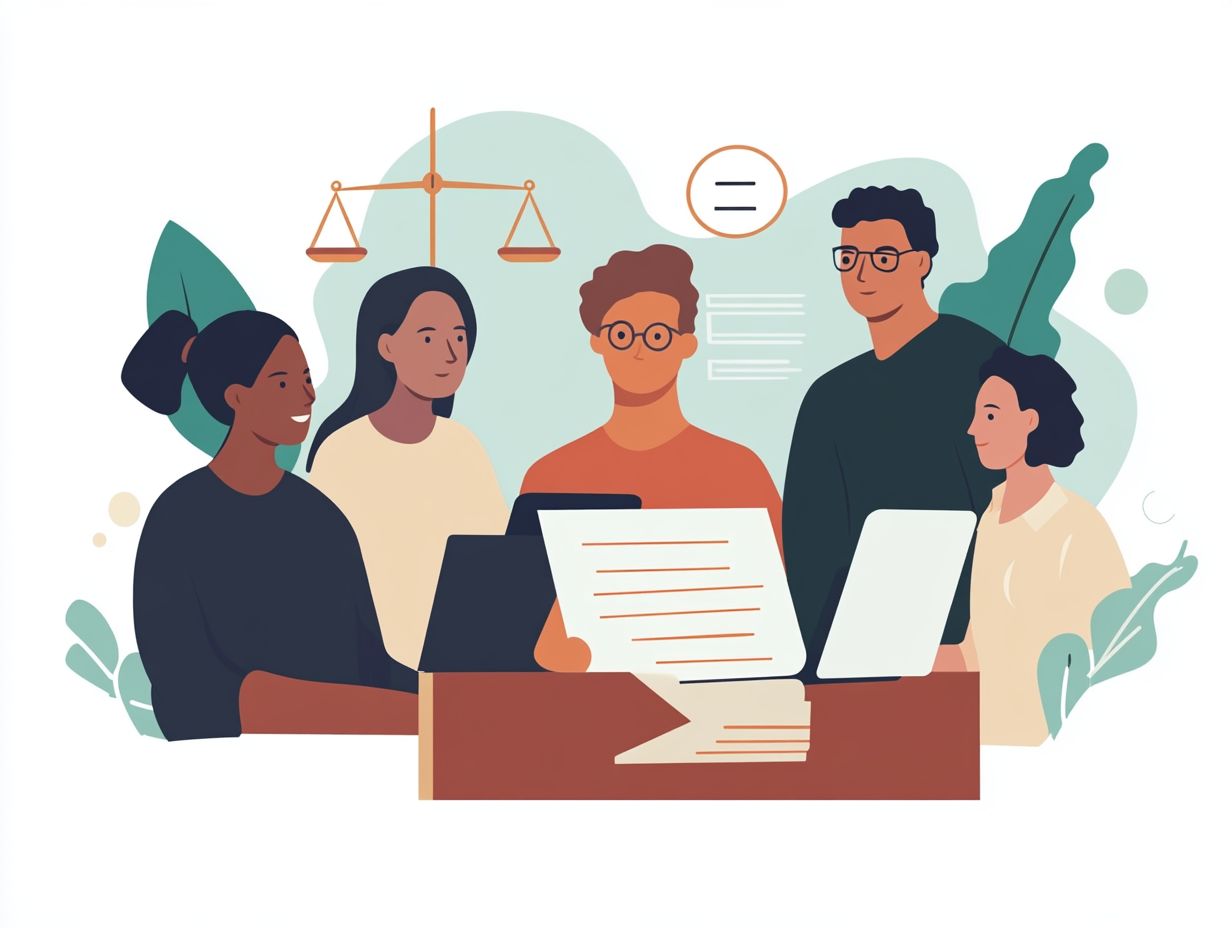
Get free legal advice and representation in court through legal aid services. Income requirements and other factors determine eligibility. Know your legal rights and protections by working with a legal aid lawyer and understanding the application process.
Understanding Legal Aid
Understanding legal aid is essential for low-income individuals in New York. It unlocks vital access to justice and legal representation across a range of issues, from criminal trials to civil matters like housing law, immigration law, and family law.
The Legal Aid Society and various nonprofit organizations play a crucial role in providing legal support, ensuring that every New Yorker can comprehend their legal rights and pursue justice. In a setting where we need significant improvements in our legal system, legal aid stands as a beacon of hope for those grappling with legal challenges.
What is Legal Aid?
Legal aid includes many services designed to assist individuals who lack the financial means to hire an attorney. This ensures that everyone, particularly low-income individuals and families, can access justice.
These services generally fall into two main categories:
- Civil legal aid, which tackles issues like housing, family law, and social security.
- Criminal legal assistance, dedicated to defending those accused of crimes.
Each service type is essential for protecting rights and ensuring fair representation. Advocacy groups play a pivotal role, raising awareness of available resources and pushing for policy changes that improve access to these critical legal services. Their efforts not only educate the public but also empower those in need to pursue the necessary legal support for navigating complex challenges.
Who is Eligible for Legal Aid?
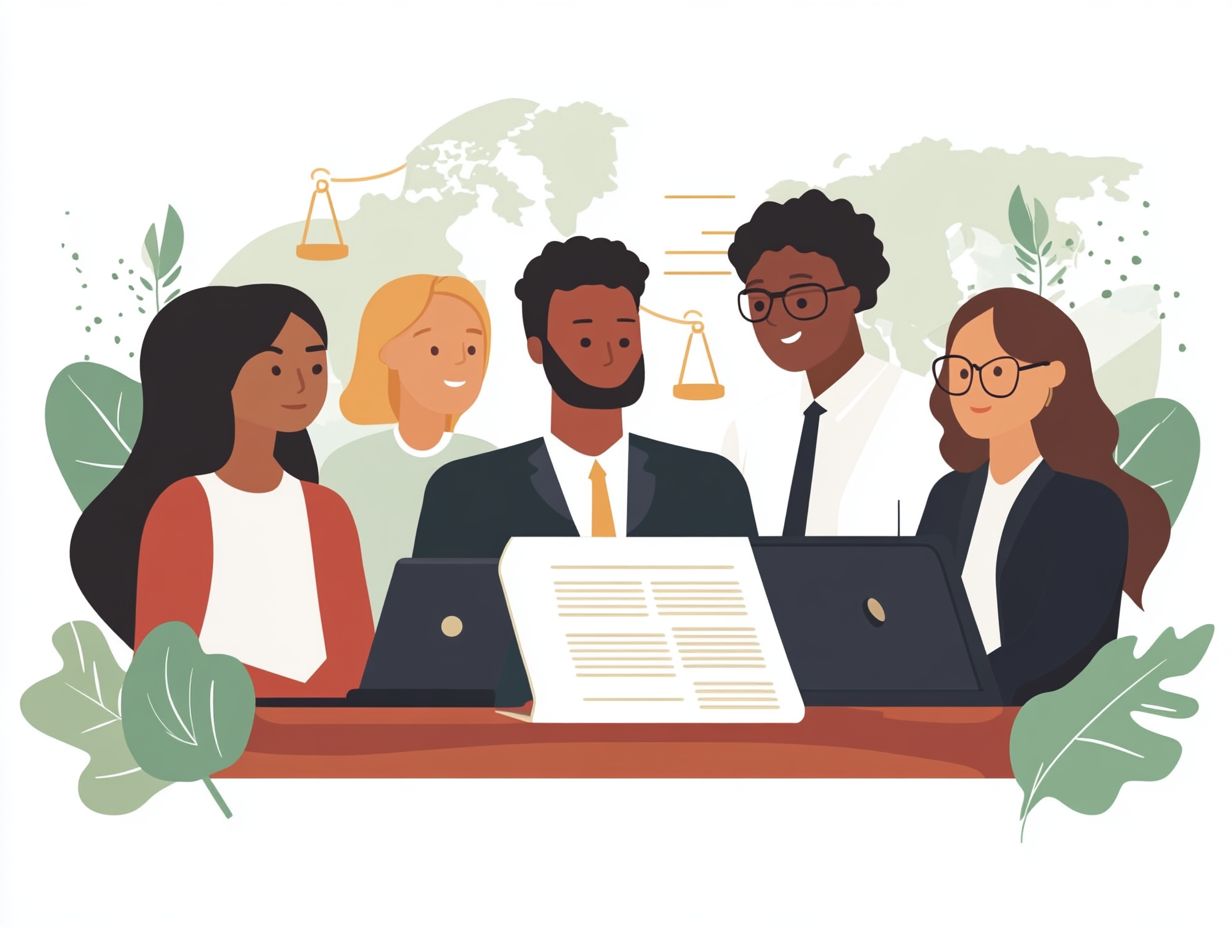
Eligibility for legal aid largely depends on your income level, particularly if it falls below federal poverty guidelines, which adjust according to household size. If you’re low-income, knowing your rights to access these services is vital. Understanding these parameters helps you get the support you need right away.
Income Requirements and Other Factors
Income requirements for legal aid services depend on federal poverty guidelines, assisting organizations in determining eligibility for low-income New Yorkers seeking legal assistance. These guidelines consider various factors, such as family size and financial obligations, to offer a comprehensive view of an applicant’s financial landscape.
For example, a single parent with two children may qualify for aid even if their income is just above the federal threshold, thanks to dependent costs like childcare. If you re facing significant debts or high medical expenses, those burdens can also affect your eligibility.
By accurately reporting your income and expenses, you ensure that legal support reaches those who truly need it, contributing to a fair legal system that remains accessible to all.
Types of Legal Aid Services
You can access various legal aid services designed just for you. Whether you’re navigating challenges in civil matters such as housing law, immigration law, family law, or public benefits, there s support available. In criminal trials, having legal representation is essential for safeguarding your rights and ensuring a fair process.
Free Legal Advice

Free legal advice is readily available through legal aid organizations, legal clinics, and community groups. These resources help those who struggle to cover traditional legal fees by offering valuable guidance on a range of legal issues.
They provide support in areas such as:
- Housing disputes
- Family law
- Immigration matters
- Employment rights
By tapping into the expertise of volunteer attorneys and paralegals, you can gain a clearer understanding of your rights and better understand the legal system.
Community organizations play a key role in facilitating access to these services. They often identify individuals who need help and offer educational resources to help you make informed decisions throughout your legal journey.
Representation in Court
Representation in court is a vital aspect of legal aid services, enabling low-income individuals to secure legal representation during civil litigation and criminal trials. This invaluable support ensures that those who might otherwise struggle to afford legal assistance can effectively navigate the legal system.
The journey to obtaining such representation typically begins with an application for legal aid, where you outline your financial situation and the specifics of your case. Legal aid covers a range of matters, including:
- Family law
- Housing disputes
- Immigration issues
- Criminal defense
Having a skilled legal professional to advocate for your rights is crucial. They bring the expertise needed to guide you through legal intricacies, negotiate settlements, and represent you competently in court, ultimately safeguarding your interests.
How to Apply for Legal Aid
When applying for legal aid, you will typically reach out to a legal aid organization to kick off the process. During this initial contact, you ll need to present specific documents and information to help determine your eligibility for their services.
Application Process and Required Documents
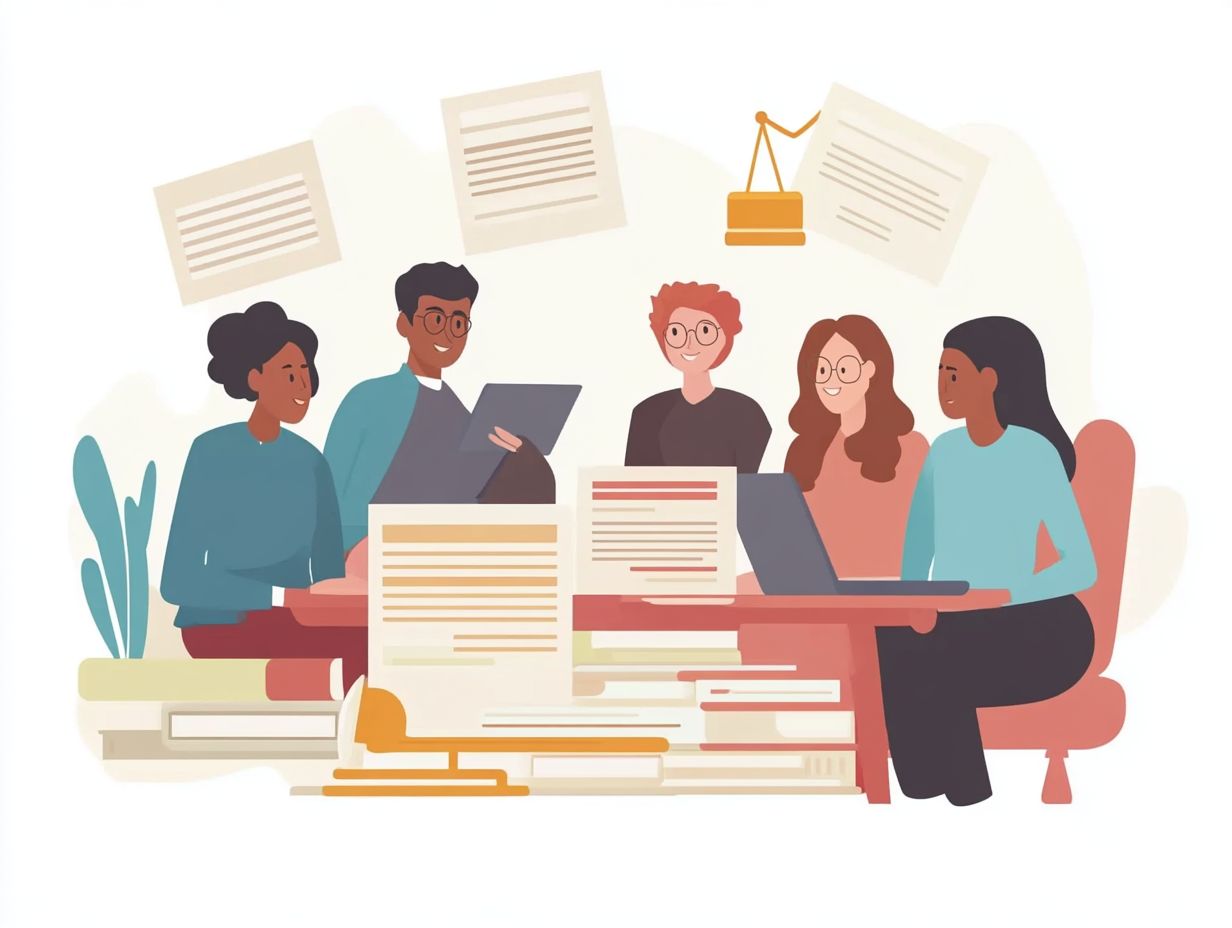
The application process for legal aid services requires specific documents that demonstrate your eligibility. This includes proof of income, identification, and details about the legal issue you’re facing.
In addition to these key documents, you may also need to present tax returns, utility bills, or bank statements to further substantiate your financial situation.
To make the process smoother and minimize any potential delays, gather these materials well in advance. Organizing them in a tidy folder will ensure that you can easily access everything during the application review.
Creating a checklist of the necessary items can be incredibly helpful. This way, you can navigate the experience with less stress and greater efficiency as you seek the assistance you require.
Working with a Legal Aid Lawyer
Collaborating with a legal aid lawyer can be a transformative journey when navigating legal challenges. These dedicated professionals offer essential representation and tailored guidance that addresses your unique circumstances, ensuring you receive the support you need.
What to Expect and How to Prepare
Understanding what to expect from the legal aid process and how to prepare effectively can significantly enhance your experience. Gathering relevant documentation like previous court records, notices, and personal identification will help streamline your meeting.
It s also wise to formulate specific questions about your case. This will clarify any uncertainties and ensure all your concerns are addressed.
By familiarizing yourself with the overall legal process, you enable yourself to discuss your situation and goals with your lawyer more easily. This ultimately leads to a more productive and efficient legal journey.
Knowing Your Rights with Legal Aid
Understanding your rights is crucial as you navigate the legal system, especially if you depend on legal aid services. This knowledge enables you to secure the assistance you require and safeguard your legal rights effectively.
Understanding Your Legal Rights and Protections
Knowing your legal rights can change your life! Let s explore how you can protect yourself against issues like discrimination, eviction, and other legal problems that low-income individuals often face.
Being informed about your rights helps you stand up for yourself and seek justice when needed. Recognizing resources like legal aid organizations, which provide free or low-cost assistance, is essential.
Support groups can be very helpful in guiding you through the specific protections available under local, state, and federal laws.
By utilizing these resources, you can take charge of your situation, address injustices, and find the guidance necessary to tackle your legal challenges. You don t have to face these issues alone; support is available for your pursuit of equality and fair treatment.
Frequently Asked Questions
What is Legal Aid?
Legal aid provides free or low-cost help for those who can’t afford a lawyer. It can assist you in understanding your rights and navigating legal issues.
Who is eligible for legal aid services?
Eligibility depends on your income, assets, and the type of legal issue at hand. Generally, low-income individuals facing issues related to their basic human rights qualify for assistance.
How do I apply for legal aid?
Don t wait! Contact your local legal aid office today or visit their website. You ll typically need to provide details about your income, assets, and the legal issue you re facing.
What types of legal issues can legal aid assist with?
Legal aid can help with various legal matters, including family law, housing, employment, immigration, and criminal cases. The specific services available may vary by location.
Will I have to pay for legal aid services?
Most legal aid services are free or offered at a reduced cost, based on your income and the nature of your legal issue. However, some services may require a small fee or certain court costs.
What should I expect when working with a legal aid lawyer?
A legal aid lawyer will give you legal advice, help you fill out forms, and represent you in court if needed. They will explain your rights and options, ensuring you make informed decisions about your case.



